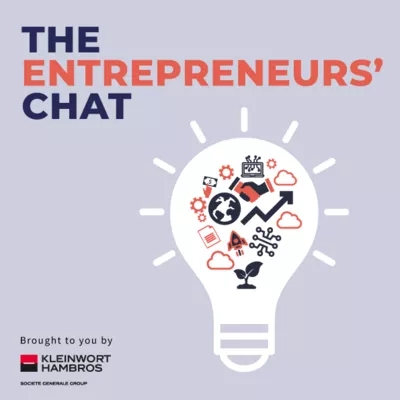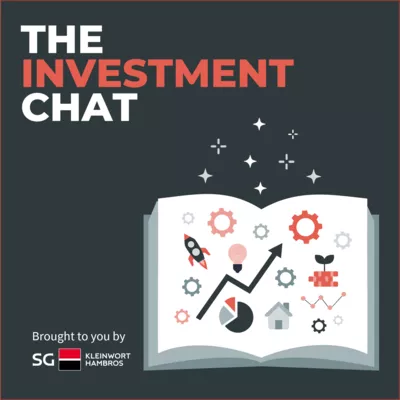
COMPETITIVE SOCIALISING, with Swingers, the crazy golf club
Transcript
The Entrepreneurs Chat
Ep 3 - Swingers, the crazy golf club
00:00:05
James Hurley: Hello, and welcome to the Entrepreneurs Chat, a podcast brought to you by Kleinwort Hambros. I'm James Hurley, assistant business editor at The Times, and I'm your host. From start- up to sale and everything in between, building a business can be rewarding, frustrating, inspiring, exhausting, certainly never straightforward. So this is the show where we go behind the scenes examining the highs and lows that come with growing a company. Today, I'm meeting Matt Grech- Smith. The co- founder of crazy golf chain, Swingers.
00:00:31
Matt Grech-Smith: We couldn't work out why it was so profitable and we suddenly realized that we've got three revenue streams. We've got food, drink, and we've got crazy golf. And the crazy golf is a fairly high gross profit revenue stream in that it's expensive to build the courses, buy the putters, and get them fitted out and up and running. But actually, when you've got the throughput of people coming through the course, they tend to pay themselves off quite quickly.
00:00:58
James Hurley: Who would've thought that crazy golf wants to preserve a fading seaside resorts would prove to be the next big thing for a night out. With friends. Matt Grech- Smith and Jeremy Simmons started their entrepreneurial journey at university when their club night promotion side hustle turned into a thriving company. They, in turn, led to successful careers in advertising. The pair left their well- paid jobs to test their hunch, their generation falling out of love with the pub might prefer what's come to be known as competitive socializing. Eight years after the friends first set up a temporary course in East London, their brand, Swingers, is proving to be a multi- million pound hit in the United States, as well as in London, and they have plans for the business to be worth 500 million pounds by 2025. Hurdles have included convincing door staff that punters can be trusted to safely combine booze and golf putters and a foray involving Nancy Pelosi.
Matt's here to tell us all about it. So competitive socializing is an established industry now. You can do everything from Axe throwing to virtual clay pitching shooting to darts. But back in 2014 when you started Swingers, that wasn't really the case, was it? Can you explain where the idea came from, and why crazy golf?
00:02:08
Matt Grech-Smith: We started thinking about this in 2014, and we had this, myself and Jeremy, my business partner, had this track record where we'd started out whilst we were at university and we'd built quite a big business organizing essentially club nights. So venue operators would come to us and say, " Look, we're really busy on the weekends, but during the week can you make our venues busy for students? We'll put on some kind of drinks offer, you put on DJ, give it a brand, and then you can charge entry on the door." So we started out. Jeremy was in Leeds, I was in Manchester, and we suddenly built this quite big business. We were working for a chain which is now known as Novus, but at the time was famous for its Tiger Tiger venues, and they were these sort of 2000 capacity venues. And we ran an event, this was must have been 2004 to about 2010, called Vodka Island.
And it's kind of shows you the era we were in, but it was one pound 50 for a single, two pounds, 50 for a double. That's a vodka and Red Bull. And I think for a while, you could get a treble for 3. 50 as well, although that was rapidly stamped out. But 2000 students used to come to the Volgar Island in Manchester every week. It was the place to be. It was a Monday night. We got students, we got people that worked in the retail industry, people that worked in hospitality. And we grew it into this kind of big network around the country to the point where we were running about 25 events a week and selling about a million tickets every year. And through that, we had these kind of this youth marketing infrastructure in every city, and brands started coming to us saying, " Look, you can reach students in a really credible kind of grassroots way," and youth marketing was seen as a bit of a dark art.
So these brands were coming to us, and that reached the attention of some kind of bigger marketing groups. And we eventually got bought by Chime PLC who had a big top five advertising agency called VCCP. And so we got placed into there, became a division of that. And we carried on running those club nights, but also looked after all of their experiential needs, which was becoming a bigger and bigger thing. Brands were coming to them and saying, " Look, we exist online, but how can you give us an offline presence?" And we also handled their kind of youth marketing for them as well. So it was a very formative couple of years. We'd gone from running completely our own business. We are now in this big London ad agency where we learn a huge amount, definitely got professionalized.
When we finished our earn out and we knew, we wanted to kind of go back to doing our own thing. And so we had this unique kind of experience at that point where we knew nightlife, we could see the rapid trajectory of the experience economy, and we were looking round. And at the time, you could go and play ping pong, you could go and do some upscale bowling. We were like, what if you could go and play crazy golf and it was in this theatrical immersive world? And furthermore, we've all been to these leisure venues where the food and drink is perhaps a bit of an afterthought, but what happens if you go to one of these places and the food and drink is really, really good. So we put together Swingers, the crazy golf club, which drew on the kind of English country heritage. We designed it like an English country golf club, but we brought restaurant brands in as well to handle the food, and we'd ran some great bars.
That was how it started out, just sort of seeing where the market was going. And in the process, we coined this raise competitive socializing, which was the idea of going out and doing something more than just eating and drinking, having an activity that gets you up and away from the table. And most importantly, something to photograph for Instagram.
00:05:50
James Hurley: Just to take you back slightly, I'm really interested in the fact that you and Jeremy managed to build such a successful business with really some considerable scale While you were university students. Did you actually manage to graduate? Did you manage to balance business with your studies?
00:06:04
Matt Grech-Smith: Yeah. When I look back on, it was absolutely insane because we were running these events, sometimes 20 odd events in a week a around the country, managing this kind of workforce, and yet I still managed to graduate. I remember there was a period where... I think I did four years at university because I changed course nothing to do with the business. And so I think at the end of my third year, I remember doing an exam on the Monday in Manchester, and then I'd hired a mini and driving down to Portsmouth to supervise an event there, and driving up to Newcastle before coming back to Manchester to do an exam at the end of the week. And I don't know what I was thinking or how I did it, but as I got to my finals I said, right, I have to completely step out of the business for a month or so. And I revised crazy and I managed to graduate with a two one, so go figure. Either I somehow fluked it or just the degree wasn't that difficult. But yeah, I managed to get away with it.
00:07:01
James Hurley: And I'm guessing you weren't taking yourself up on your vodka Red Bull offers at the time either.
00:07:05
Matt Grech-Smith: No. Best not to get high on your own supply, I think.
00:07:08
James Hurley: Yeah, exactly. And so when your business got bought, what was that like? From having been two young guys with a entrepreneurial business and making money, and then you go into this, as you said, a very professional environment, was that something you coped well with? Did you thrive in that environment, or was it something that you found difficult, being managed?
00:07:26
Matt Grech-Smith: That is a good question. I think at the time, it was very exciting getting to do this kind of deal, and Jeremy and I made a little bit of money out of it. We joined this big ad agency. And I think we were... I'm trying to think how old we were at the time. Probably, I was about 27, and Jeremy's a little bit younger than me. So I think we went into it with these very big ideas about what we might be able to accomplish and how we might be able to set up this massive youth marketing agency and where we were going to take all our events and that sort of thing. I think in practice we slotted into a very, very big machine, and it was massively challenging trying to integrate into a big agency. We learned it's easy to buy a business, but what you do with it next is the real challenge.
And I think there was... From the agency we joined, they didn't quite know what they'd bought. I think they went through this whole process. And what was interesting is no one ever came to one of our events in the whole time we were going through that sale process. I think someone on their team always thought that someone else would do it or it wasn't their job. There was no role in their infrastructure that was go to the events of the youth business that we're buying. And so I think there was a moment when the sale completed where they suddenly thought, oh my God, what have we bought? We've bought this business that's got thousands of students essentially getting drunk every week. And then there's just lots of competing parts of the agency. They would say, " Oh, we've got this client that's come to us," maybe some, I don't know, online fashion retailer. " Can you come and join the pitch?"
And so you'd spend weeks of work kind of putting together all these youth stats and creative and all that sort of thing. And then the agency might win the pitch, but that would then go and sit in the main agency, and weren't very good at then saying, " Okay, we will give you your piece of the pie." So there were lots of frustrations and lots of challenges, but we got to sit at the top table of this big ad agency with all the divisional heads and see how it was run, and we learned a huge amount. And so swings some roundabouts, really. But when we got out I think we thought, wow, after three years that's been a real grind, and it was incredibly... It was a massive release to be able to walk away from that and go back to being entrepreneurial again.
00:09:47
James Hurley: And that was in 2014, wasn't it, that you founded the Institute of Competitive Socializing, the holding company for Swingers? What was the reaction when you told friends, family, contacts, colleagues, that sort of thing, that you were leaving presumably quite well paid jobs to go and start a crazy golf business?
00:10:06
Matt Grech-Smith: I think there was a general state of amusement. This was a different time when... Like you said in your intro, there's so many different activities you can go and do these days, but back then these things didn't really exist. So you could see in people's eyes there was a look of, " I'm not sure this is the best idea," and " Really? Crazy golf? Is that going to work?"
00:10:26
James Hurley: About you and Jeremy? Did you have doubts and concerns about it, despite obviously thinking it was a good idea?
00:10:31
Matt Grech-Smith: We set out by testing the idea. So we did a popup in 2014. And I think we'd definitely seen the potential of this idea. We'd come up with the name Swingers pretty quickly, and it just clicked. It was just a name that works, that you would never forget and kind of had a cheeky connotation to it, obviously. We liked the idea that it played on the heritage of golf and you had this whole world that you could draw from, this kind of theme of an English country golf club. And so we saw that it had massive potential, but we said, let's test the idea. So we found a 7, 000 square foot warehouse in (inaudible) , which is now underneath the Amazon headquarters, which shows how the world moves on. But it was this, yeah, leaky warehouse. When it rained heavily, water poured in. There were rat sightings where the rats were the size of small Jack Russell's.
But we thought, let's test this concept. We were used to the world of events. Let's build it like a sort of three month event and test it out. And so we launched it. And we launched with a website called The Nudge, which is still around today, and it is where people go when they want to find out about the new things to do in London. And I think at the time, they had a database of about 15,000 kind of highly engaged Londoners who wanted to find out about the next new thing. And we went out with them with this email that said, " Come and play crazy golf in East London. You can have Patty & Bun and Pizza Pilgrims food, we'll bring you cocktails on the course, and yeah, come and play this game, which has this nostalgic connotation everyone's played, you probably played on holiday as a kid." And it went crazy.
The email remains today, the most forwarded email they've ever sent out. I think it got boarded 140, 000 times. So it was clearly people just sending it to their friends saying, " Oh my God, we've got to do this." The website crashed because we didn't have anywhere near enough bandwidth. And I remember Jeremy and I sat at my kitchen table with our head in our hands knowing we had this product that people wanted to give us money for, but we had no way of taking their money. So lots of begging and pleading with our web guys to transfer it onto a bigger server and them sucking their teeth about how long it was going to take. But eventually, we got back up and running and the popup sold out for, I think it was five months in the end, which then from there gave us enormous confidence about where we could go with it all.
00:12:56
James Hurley: And I think in that five months, didn't you produce something like 300,000 pounds in profit? Can you just explain why it went so well? And were even you guys surprised by the scale of that success of what after all was just a sort of test and learn site at that stage?
00:13:11
Matt Grech-Smith: Yeah, I think we always start out with our kind of business ventures with what I call the pessimistic realistic approach where you really don't get too optimistic and you kind of cater for a very average scenario. And so we built the whole business model on being open Thursday, Friday, and Saturday. The popularity from the get go was such that we kept adding days straight away. So by the end of the popup, I think we were open seven days a week. So instantly, we were doing more than double the kind of revenue days that we initially forecast. And then there was this also this really interesting moment where we got our first P& L from the pop- up and we weren't very experienced in hospitality. We knew how to do event P& Ls and we were experienced in that world, but we'd never had the bars and overseen the food revenue and all that sort of thing.
And we couldn't work out why it was so profitable. And we suddenly realized that we've got three revenue streams, we've got food, drink, and we've got crazy golf. And the crazy golf is a fairly high gross profit revenue stream in that it's expensive to build the courses, buy the putters, and get them fitted out and up and running. But actually, when you've got the throughput of people coming through the courses, they tend to pay themselves off quite quickly. And then your running costs are really only the caddies that stand on the core and replacement balls and putters every six months to a year. So we were looking at the bottom line of this P& L sheet thinking, oh my god, this is actually incredibly profitable. If you can get people through the doors, this is insane. This is kind of the holy grail of hospitality, having this third revenue stream that just gives you that breathing space to run a good business and reinvest back into the product.
So yeah, it suddenly started throwing off some cash and we were able to pay off our setup costs and think about it as a longer term business.
00:15:13
James Hurley: Do you think that explains why we've seen this explosion in competitive socializing concepts? I seem to remember the founder of Flight Club, the darts company, saying something similar to me about just how profitable it is. And actually just recently, I had a go on the virtual clay shooting business and the founder of that was talking about being actually surprised at how high margin it is. Is that what's behind, the explosion in competitive socializing that we've seen in recent years, do you think?
00:15:41
Matt Grech-Smith: Yeah, I think so. I think we were one of the very first to market, and people saw the performance of our business for sure, and used that as a kind of pilot, and that gave them the confidence to launch their businesses. And I think we know historically hospitality has been a very difficult business to run, probably now more so than ever before, but the overheads are high and the line at which you switch from making money to losing money is a incredibly fine line. You're not necessarily in control of a lot of your costs or a lot of the macro environment that dictates whether people can or can't walk into your venues. So if you can find this third revenue stream, which like I said is very, very high profit margin, it is a game changer. And I think, yeah, lots of people have discovered that and that's why we've seen this boom in competitive socializing in London, not necessarily... We're in New York now and we've got a lot more of the market to ourselves, but I'm sure that's about to change.
00:16:42
James Hurley: Just before we go on to New York, I just wanted to ask you one more question about your test experience. When I wrote an article about your business in The Times, you said to me that you didn't have a well crafted business plan actually, and it was just sort of get up, get on with it, crack on, and see what happens. Do you think there's a lesson in there for buddy entrepreneurs about when they've got an idea, maybe just get on with it and test and learn rather than spending too long trying to hone a business plan?
00:17:09
Matt Grech-Smith: I think it's a middle ground. I think you obviously have to do some research and don't go into it blind, but also you can try and research, and you can kill the spontaneity. Sometimes you just have to iterate. You just have to get it out there, have your minimum viable product, as it were, see if it works in a controlled way. Don't bet your house on it, but try an idea out, and then you can iterate from there. So I think that's definitely a big component of it. But I think the key thing is just being clear, is there an audience for what you do before you start? I think it being in this world where we come into contact with a lot of founders and a lot of people that are developing products, sometimes you hear about things and you think, who's that for? Is that for you or is that for a wider market?
And I think we went into our business, perhaps not with the most honed business plan, but we knew what the costs were and we had a really good idea that there was a audience for our product, that there was a demand for what we were creating. So yeah, that's what I'd say. I'd say don't try to plan everything, get out there with a product and test it, do it in a controlled way, but do be absolutely sure that there's a big enough group of people that want your product, because otherwise, what's the point?
00:18:32
James Hurley: Yeah. And you mentioned New York. And an unusual aspect of your business, I think, is that you've expanded into the United States so quickly cause you've got, I think, two successful sites in London, and then rather than following the received wisdom that you sometimes hear from investors that you know, must crack your home market, don't go into United States. So many British businesses have tried the United States and failed. You actually went into the United States, and you're doing very well, as I understand it, in both New York and Washington dc. Tell me about why you made that decision to go to the United States so quickly rather than focusing on the UK or indeed an expansion into Europe, for example.
00:19:07
Matt Grech-Smith: Yeah, it's weird because it actually wasn't that fast. I think when you look at the actual chronology of the business, there's been quite a few intervening years between the pop- up and where we are now. So the pop- up ran 2014 to 2015. In 2016 we opened our first site in the city of London, which went amazingly. It was right by the (inaudible) . It was a whole level of production above the pop- up, and people had never really seen anything like it. And we had these queues around the block, and we're basically completely oversubscribed. So from the get- go, we knew that there was potential to do more in London. We knew we had this incredibly universal concept and that there was a lot of kind of scrutiny on us because the concept was interesting. And like I said, it has this revenue stream which made it incredibly cash generative.
So we always knew there was this international possibility. So I don't know, perhaps we're precocious or overambitious, but after the city site opened, we did fly to New York and start talking to real estate people and looking for sites. And actually on our first site visit to New York, we did find the property that we ended up with. And they were building a Virgin Hotel, or just literally starting to build a Virgin Hotel on the corner of 29th Street and Broadway. They'd barely broken ground. And it is going to be the 65 story building with a huge basement, which we knew would be perfect for Swingers. So we very strongly registered our interest for that and went into contract negotiations, which went on for some time. But in the meantime, came back to London and opened Swinger's West End, which is in the old BHS. That was in 2018, and that was another 20 odd thousand square feet, which again, went really well, launched really strongly and there was loads of demand for.
And then the second part of 2018 saw us doing our funding round. So we brought in private equity capital for the first time, and that secured us a load of capital to go and open more sites. And 2019 was really about starting to build that pipeline. We had these two big venues in London under our belts. Each one was turning over about 9 million pounds a year, so 18 million pounds in total. So it was like being on a kind of a runaway train where we were just clinging on for dear life. We started out with this crazy golf popup, and then I thought, okay, well let's open a permanent site, and that might do around five or 6 million pounds a year. And suddenly we were doing 18 million pounds a year. So there was a lot of kind of catching up with ourselves we had to do and making our infrastructure work. Did this funding round, so we had some money in the bank.
Then, as we all know, the pandemic hit, so that was a period of huge readjustment and figuring stuff out. But all the while, our New York lease had been getting signed, and then work had started on the building site. However, it was this 65 story building that had to go up. Things like the pandemic, some issues, the landlord experienced meant the build kept getting delayed and delayed. And so we knew that it was going to be a little while before it got handed over to us and so that we could fit out our site. So we started looking around and we hit on Washington DC as a city we absolutely loved and somewhere that we could do in the meantime. And you asked why we went to the US. And I think we knew we had this concept.
It was incredibly transferable. It's got this mini golf at its core with food and drink, it's hospitality, but with something extra. And it just resonates with people. We could see the reaction that people in the UK were having. We knew the international interest and the focus we were getting. We knew that someone else was going to start rolling out venues like this. So if it wasn't us, someone else was going to get there before us. And then I think you just do this research into cities in the UK and the US. And there's always an opportunity cost about where you go next in terms of your time, because it's a huge effort getting these sites open, and then the capital because... It's in the region of 10 million to open one of these sites, so you have to be incredibly strategic about where you go. And we were looking around the UK. And there are some great markets in the UK.
There's places like Manchester and Edinburgh and Birmingham where we could definitely go and have a great business. But then you look at the metrics of some of these big US cities, and the concentration of corporates, the population density, the dating culture, the street food scene, all of these things just added up to incredible Swinger cities. And then the fact that you could place a head office in the US as well, and then go and exploit all of these markets. So we just wanted to get to places like DC and New York before someone else did. So we have huge respect for Manchester, Edinburgh, and those other UK cities. I think we felt like we had a big machine in London, two massive venues. Now, we've got in the region of 47, 000 square feet of space in London. So I think we just wanted to see where that settled. But yeah, we do hope to get to other UK cities and other time.
00:24:36
James Hurley: What have been the biggest hurdles for you to get into this point? It's presumably it's not all been plain sailing. You mentioned COVID there and that must have been quite hairy and presumably you were pleased to have the capital behind you to help you get through that period. What have been the most challenging moments for you and Jeremy?
00:24:50
Matt Grech-Smith: You alluded to before, just getting planning on our second site in the West End. We had this very successful site in the city. We knew that a second site really had to be in the West end. And that was really difficult to find that kind of space. We need 20 odd thousand square feet of space. It's got to be roughly in one space rather than broken up into rooms and space like that in the west end didn't use to be available at all. So we found this space in the old BHS within sight of Oxford Circus. We knew it was kind of perfect for us, but we had to go and convince Westminster Council that ours was an appropriate change of use because they see Oxford Street as very retail based. They didn't want to change that. So we had lobby them. We had to go to these very stressful committee meetings and convince them that actually this change of use would be something that would bring people to the retail area of (inaudible) Street and be a really good use.
So luckily they saw that, but a huge amount rested on that decision of West Westminster Council because that was going to be our second site, and it was really difficult to see where we could go if we didn't get that property. So I remember huge stress around that. Our first funding round, that definitely came with some challenges, because we were going to private equity firms and saying, " We've got this really successful business, it's really cash generative, but the next site we want to go and do is in New York, and that's going to cost about 12 million to fund." So a lot of private equity firms totally got it, but they'd have to go away and they'd have to write an investment paper and give it to their investment committee. And you could just see at that point, when the investment committee read it, they would just say, " What the hell is this? The risk factor in this is so high."
So that gave a lot of private equity firms kind of heebie- jeebies. But luckily, we found our current investor, Kane International, who are very entrepreneurial. They totally got what Swingers was all about and could see its potential and were willing to take that risk with us. So that was great. COVID, yeah, what can you say about COVID, but it was a whole period of time that I would never want to repeat. I basically sat in my spare bedroom for about a year and a half on just nonstop Zoom calls trying to figure out what to do with the business, how to look after our staff, how to kind of keep our cost base in the right place. So it was horrendous, but we were very, very fortunate in that we had raised our funding and our backer did say to us, " We do believe the market's going to come back." Let's continue with the plan. So we kept our New York lease and actually during the pandemic, we started fitting out in Washington DC so that we could open that right on the back of the pandemic.
So you tend to forget a lot of the issues and traumas you experienced as an entrepreneur, I think. Otherwise, you'd end up giving up and going and trying to have a quiet life somewhere.
00:27:49
James Hurley: And speaking of that, didn't you find yourself in the middle of a mini media storm when you were opening your Washington DC site and one Nancy Pelosi decided to take her mask off for her round of golf?
00:28:00
Matt Grech-Smith: Yeah. Being in DC and having this kind of cool new venue has been very interesting. I just got back from the US actually, and I was standing in at home in London in my kitchen, and my phone started going crazy and I couldn't work out what was going on. And then it turned out that, yeah, Nancy Pelosi had been into the venue as part of a, I don't know, some kind of corporate event. And at the time there was a mask mandate that got reintroduced back into Washington DC where you had to wear your mask the whole time you were in the venue, apart from if you were seated at a table. And she took her mask off, someone, took a photo, and the right wing media ran with it. " Why was Nancy Pelosi in a venue called Swingers with her mask off? Did I have any comment? Had she been approached?"
So it was suddenly a bit like (inaudible) house of cards or something. I was like, why am I standing in my kitchen in London having to deal with our PR company about the speaker of the US government taking her mask off? But luckily, we ignored. It blew over, and we remained in favor with us politicos because we actually had a visit from Barack Obama over Thanksgiving who came in just before we opened with his wife and kids, I believe. So yeah, the political establishment remains forgiving of Swingers in DC, I'm happy to say.
00:29:22
James Hurley: So maybe the publicity was a good thing in the end. As I mentioned before, a lot of UK businesses have struggled in the straits where whereas you guys have done very well, perhaps that's just the model and you guys have been good at executing it. But I was just wondering if you had any tips or lessons that you've taken from doing business in the states, things you've had to learn that differ from expanding in the UK?
00:29:42
Matt Grech-Smith: I'm always very wary about handing out tips and advice because I'm aware that I could fall flat on my face at any time, but we've had a very interesting ride over the last couple of years in the US because New York got pushed out and ended up opening a lot later than we expected. As I said, we ended up going to DC first, and that actually really acted in our favor because it kind of was like a pilot scheme for us. We got to launch our first Swinger's venue in the US in a much more forgiving environment. So we opened in DC in June, 2021. It was just as the pandemic restrictions lifted in DC, so there was this amazing feeling of excitement that people were able to go back out and having this experiential venue that opened, certainly chimed with people's excitement.
It was incredibly tough hiring in DC when we first opened. That was probably the biggest thing that we didn't allow for enough. Just as we know overall, a lot of people left the hospitality industry over the course of the pandemic and went in search of somewhere that was perhaps a better employer or a more secure employer. And that was never more true than in DC where we found ourselves having to fish in a very shallow pool for staff. So it took us a while to get our customer product right, because we were short of staff, we had to do huge amounts of staff training. But we were lucky that in a place like DC, it was a forgiving enough environment that we had some time to get used to that. And then coupled with that, there is a whole load of changes or differences to the UK, which predominantly exist back of house.
Our customer facing product in the US is really, really similar too in the UK. And we did a load of market research before we went just to test that and just test that it would chime with the American public. We even tested the name Swingers just to check that it wasn't going to have an incredibly adverse reaction and people would refuse to book with us, but luckily it was the same slightly bemused reaction that we always got in the UK. So when we got to New York, we really went into it with our eyes open, and we knew we were opening this 23, 000 square foot flagship location right in the heart of Manhattan. So we didn't take any chances based on what gone before. So we opened in June of 2022 in New York, and we started hiring from before Christmas, making sure our management team was in place, figuring out exactly what our staff comp packages were going to be.
So we went out hiring. And we had amassed most of our staff, the kind of 120, 130 odd staff we need for that venue by about February or March. And then we put them through this incredibly intensive training plan. So we'd learn also how to market, and we went out with a big launch, lots of video content across social media and various press partners. And so if we got this surge of interest, our team were there and ready. And they'd been in the venue for months, we had an enough of them, and then knew exactly what they were doing. So yeah, like I say, it is been a huge learning curve. Again, you probably forget a load of the stress that goes with it. There's a lot that you have to change. There's state to state legislation that differs. So you can't go to the US and treat it it's the UK. You just have to go in open- minded, learn how they do it, and the rest is luck and a bit of judgment.
00:33:23
James Hurley: And what about you as an individual? Because this is a pretty substantial business now. You've got still quite aggressive expansion plans, hoping to become a business that's worth 500 million pounds, I think by 2025. As an entrepreneur, have you had to sort of change your management style, change the way you think about things? Can you tell me a little bit about the journey you you've been on since you founded the business?
00:33:44
Matt Grech-Smith: Yeah, I think it's suddenly becoming a really big business. We started out as a pop- up, and we were very hands- on. And I can remember opening the doors to the pop- up and I was standing behind the reception desk trying to make the credit card machine work because it obviously went down at the exact moment that we first opened the doors. And I worked on reception for the first couple of days. And I remember I was the person that designed our crazy golf system, our tee off system, because there were bowling alleys and there were skating rinks, but there was no crazy golf system for a venue like ours. So I designed that, and we still use that today weirdly. But I was there in the weeds, and it's been this kind of attempt to just elevate out of that. Over time, you put in place this venue management team who are much more experienced to that sort of thing than myself or Jeremy.
And we were always very clear, we are not operators, that's not our skillset. We come at this with kind of marketing and strategic know- how and experience, but we need to surround ourselves with experts. And then I kind of said, the business just got bigger and bigger. And then with that, we opened in the us. Jeremy moved full- time to the US because he's more... We are co- CEOs and co- founders, but he's more on the commercial side of the business, particularly overseas, the real estate and the build outs. So he has to really keep an eye on the build outs of the locations as they happen and make sure they stay on time and on budget. But yeah, we're going to be five venues as of the beginning of March. We're going to have this big revenue. We're hoping to be in the region of $ 70 million of revenue in 2023.
So you just can't do that as a very small team. When you're operating a between London, DC, New York, and trying to find new sites, it just becomes impossible. So we've had to recruit a really good team, both senior level, and then more mid- management. And then that has to be trained into the venues. That's been difficult. I am a perfectionist. Personally speaking, I'm a control freak. It's hard to give up control of these venues. I like to be across every single element of them. I try to look at... Anything a customer ever sees, I try to be across. But there comes a point where you just have to relinquish control, and that has kind of been the biggest thing over the last few years. But we've built this incredible team, and we've got these amazing passionate individuals who love the brand and really see where it can go, and it's such a pleasure to work with those people and people are better at doing these things than I am.
So over time, your job, you stop doing the kind of day- to- day stuff. You are not writing press releases or overseeing menus in quite the same way that you were, but you are overseeing the team who do that, and just making sure that they have enough direction and enough motivation, they know what the vision is. So that's a journey we're going to keep going on, I think, as we add more sites and more global locations.
00:36:58
James Hurley: And do you enjoy that as much, that more strategic approach, I guess, and a more management approach really, rather than being hands- on? Do you find yourself enjoying that as much as the early days of the business?
00:37:09
Matt Grech-Smith: Yeah, I think I do. I think every business follows a trajectory in an arc. And going through that startup phase was absolutely incredible, where you were in the detail and you were watching the people come in through the doors and having personal interactions with them. And I still do that when I'm in the venues, but less often. And over time, you kind of go a bit grayer and you pull your hair out all the time because you're trying to do a thousand different jobs. And some of them, you are not qualified for, but you just have to be a jack of all trades. So it is really nice as you get to this position where you've got people to do some of these things and you can kind of think about the bigger strategy, and I can think about more about my job as a CEO and less about having to run around. And someone telling me that their computer's broken.
I'll be under a desk or on a plug it in, or tell me that something's happened in a venue and you've got to run over there and deal with it in person. So it's an amazing job. I have to pinch myself all the time. I jump on and off planes to New York and DC and I'm back in London, and we're in these venues that are really exciting and people want to get involved with. And I don't know, the other week, we were filming with The Apprentice or doing a podcast like this or flying somewhere in the US to look at a new site. It's kind of the dream job, and I work really hard not to forget that because at some point, it will probably get more corporate, and I don't know, there might be openings in much less exciting places. So I really try to enjoy it in here and now. And Jeremy and I often say to each other, " This is the dream. This is as good as it gets." We have this successful concept, so we just try to enjoy every second of it.
00:38:54
James Hurley: I saw you on The Apprentice, Matt, and I thought you were very generous about those bao buns, being willing to pay for them when they turned up, because they weren't quite what was sold to you.
00:39:02
Matt Grech-Smith: No, they came and tried to sell me these dodgy bao buns, and it's a tension in that moment between completely ruining the concept to the program and refusing to buy them and being a bit supportive. So yeah, I think I ended up being a little bit generous in the end.
00:39:17
James Hurley: You came across as a nice guy, and that's the main thing. And final question, Matt. So as we were saying, you've got this plan to get to 500 million pound valuation, this growth trajectory on opening new venues. What's the long- term plan for you and Jeremy? Do you want to still be running this business in 10 years time? Do you want to get it to a certain point and sell it? What's your long- term vision?
00:39:39
Matt Grech-Smith: It's a good question. We're very focused in the here and now on the next stage of growth where we want to get this venue to a meaningful scale. We've proven the concept now on both sides of the Atlantic. So in some ways, we're just out of that kind of startup pilot phase, and now we're getting some really exciting offers about other places in the US and other places worldwide where we can take it. So we have this aim at the moment of the end of 2025 or the beginning of 2026, where we can really scale this business and build it to a really meaningful value. Like you say, 500 million is our target. Lots of people can go out there and say, " This is what I'm aiming for," and it's easy to throw big numbers around, but we have this very executable plan of if we just go and open more venues in the way that we have done at a steady but consistent rate over the next three years, then every time we add one of these big venues on, it adds meaningful sales revenue and meaningful value to the business.
So it's unusual to be in a business which has this kind of incredibly clear path where it's just go and sign these leases in a certain number of places, keep doing what you're doing, and just replicate maybe another eight, nine, 10 times, which is incredibly doable. So yeah, at the point where we have done that and we have built what we hope will be this well respected global brand, then obviously there'll be people that'll be interested in buying, and we'll be interested in looking to see what our next options are. We love the brand. We would love to stay involved with it for the long term. When it comes to opening in places all around the world, then there'll come a point where perhaps we're not the best suited people to be running that business, and then maybe the be some CEO who's got that kind of experience of rolling from 50 to a hundred sites or whatever, if it ever gets to that.
So who knows? And Jeremy and I have learned a lot about what it's like to be bought, what it's like to work with investors, what it's like to take a business from one side of the Atlantic to another, so I think we are definitely interested longer term in kind of exploring that and maybe helping other businesses that are in a similar position to the one that we were a couple of years ago. So yeah, there's lots of possibility.
00:42:05
James Hurley: And would you launch any other games? You're called the Institute of Competitive Socializing, but you just have Swingers at the moment. What about launching a new game?
00:42:12
Matt Grech-Smith: Well, yeah, we started out the Institute of Competitive socializing because we could see, yeah, you could have lots and lots of brands under that umbrella. And then Swingers just launch with such momentum. It's remained our focus, and it's hard convincing investors that we should take our focus off Swingers. So yeah, potentially more games. We are kind of always looking around perhaps with an acquisition at some point that we can put under the umbrella. So yeah, absolutely, we hope to give our institute of competitive socializing moniker its full potential at some point.
00:42:43
James Hurley: Excellent. Matt, thanks so much for joining us. It's been fascinating.
00:42:45
Matt Grech-Smith: Thank you.
00:42:48
James Hurley: Thanks so much, Matt, for joining me for a really interesting conversation covering everything from business models to international expansion, to building a business with your best friend. I'll be back next time, getting to know Joanna Jensen, founder of Child's Farm, a child and baby skincare business.
00:43:02
Joanna Jensen: And when you are in that situation and you've run out of cash, don't sit there and think, oh, I'm not going to say anything because I'll put off my existing investors. Go out there. There are angel investors who specifically invest in distressed businesses. And I went straight to a broker who did this, and I went straight to him and I said, " Help."
00:43:23
James Hurley: Make sure you're following the Entrepreneur's Chat so you're always notified when a new episode is available. Until next time, goodbye.
00:43:32
Speaker 4: Does running a business. Leave little time for managing your personal financial affairs? At Kleinwort Hambros, we know how to simplify life's financial challenges for entrepreneurs. Considering your personal and business ambitions, we partner with you at every stage of your life, taking care of your finances so you can focus on what matters most to you. Find out more about how we can help create a secure financial future for you and your family at kleinworthambros. com.
Ask us your questions
Contact usLatest podcasts











